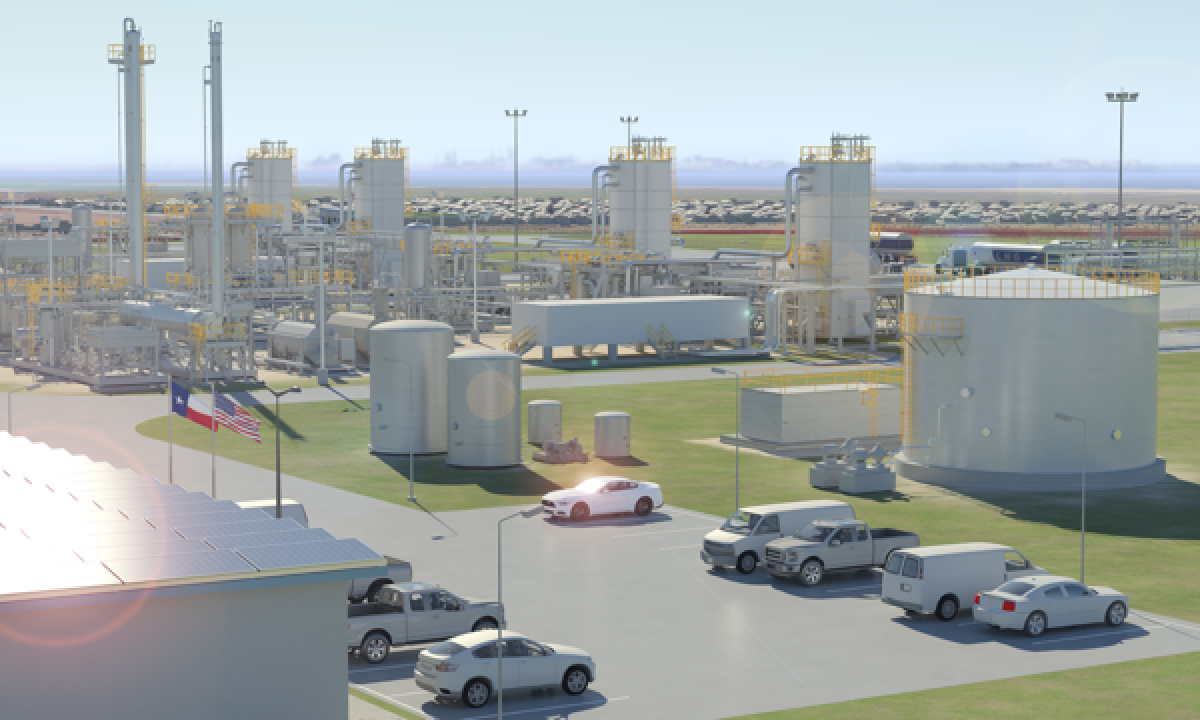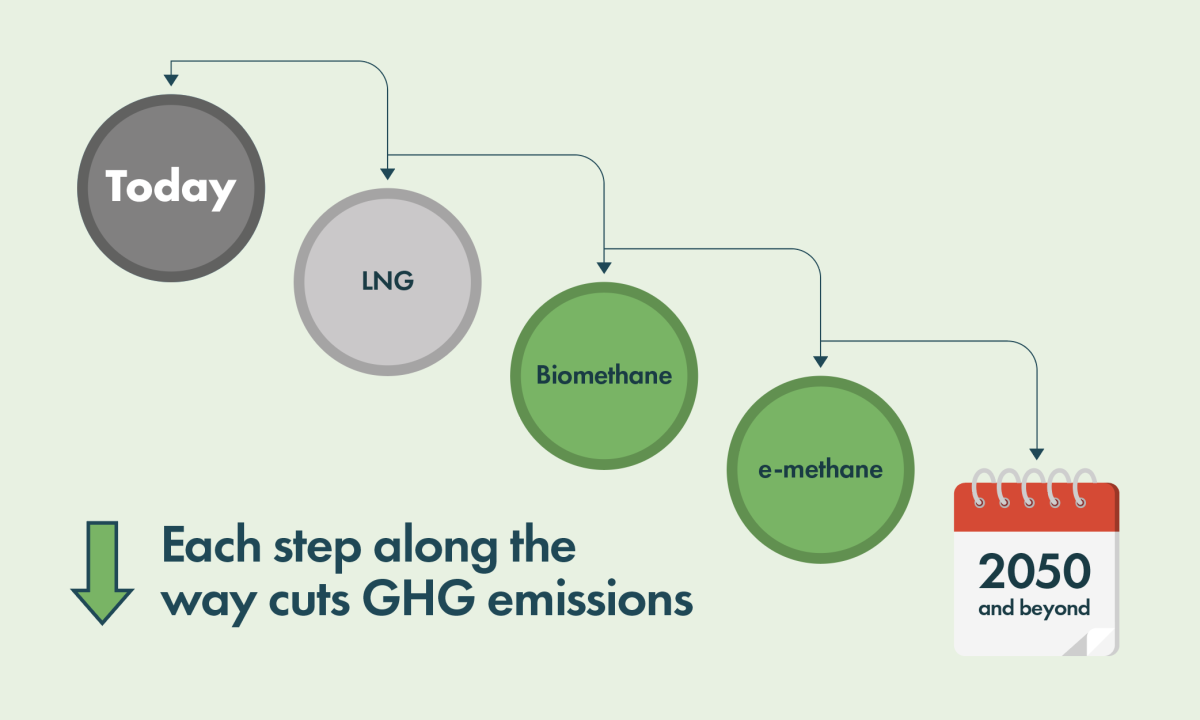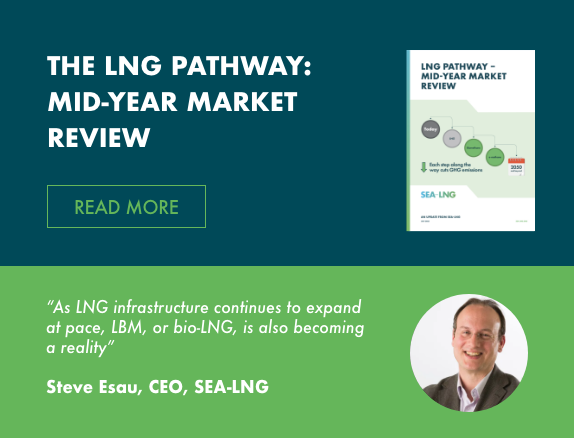11th April 2019
INDEPENDENT STUDY REVEALS LNG REDUCES SHIPPING GHG EMISSIONS BY UP TO 21%

Landmark Well-to-Wake study represents definitive figures for GHG emissions and confirms LNG as major contributor in meeting IMO’s 2050 GHG targets for shipping
LONDON, 11th April 2019: The independent study report launched today has revealed that Greenhouse Gas (GHG) reductions of up to 21% are achievable now from LNG as a marine fuel, compared with current oil-based marine fuels over the entire life-cycle from Well-to-Wake (WtW). It also confirms that emissions of other local pollutants, such as sulphur oxides (SOx), nitrogen oxides (NOx) and particulate matter (PM), are close to zero when using LNG compared with current conventional oil-based marine fuels.
The study, commissioned by SEA-LNG and SGMF, was conducted by leading data and consultancy provider thinkstep according to ISO standards. The report, which has been reviewed by a panel of independent academic experts, is the definitive study into GHG emissions from current marine engines.
“The Life Cycle GHG Emission Study is a long-awaited piece of the “LNG as a marine fuel“ puzzle. It not only confirms what we already knew in terms of LNG’s immediate impact on air quality, human health and its cleanliness, but clearly highlights the genuine, substantiated GHG benefits of using today’s marine engines capable of burning natural gas. Moving from current Heavy Fuel Oil (HFO) to LNG does reduce GHG emissions. LNG does contribute to the International Maritime Organisation (IMO) GHG reduction targets. And it is clear that LNG is the most environmentally-friendly marine fuel that is readily available and safe, both today and in the foreseeable future.”
Commenting on the report, SEA-LNG Chairman Peter Keller
On an engine technology basis, the absolute WtW emissions reduction benefits for LNG-fuelled engines compared with HFO fuelled ships today are between 14% to 21% for 2-stroke slow speed engines and between 7% to 15% for 4-stroke medium speed engines. 72% of the marine fuel consumed today is by 2-stroke engines with a further 18% used by 4-stroke medium speed engines.
Study partner Chad Verret, Society for Gas as a Marine Fuel (SGMF) Board Chairman, added: “LNG is SAFE to use, fully compliant and readily available as a marine transport fuel. Standards, Guidelines and Operational Protocols are all in place to ensure that the safe way is the only way when using gas as a marine fuel. LNG meets and exceeds all current and 2020 marine fuel compliance requirements for content and emissions, local and GHG. With the world LNG Bunker Vessel fleet doubling in the next 18 months and those vessels being deployed at major bunkering hubs, LNG as a ship fuel is rapidly becoming readily available.”
Ongoing optimisation in supply chain and engine technology developments will further enhance the benefits of LNG as a marine fuel. Additionally, bioLNG and Synthetic LNG – both fully interchangeable with LNG derived from fossil feedstock – offer the potential for significant additional GHG emissions reductions. For example, a blend of 20% bioLNG as a drop-in fuel can reduce GHG emissions by a further 13% when compared to 100% fossil fuel LNG.
Dr Oliver Schuller, Team Lead Energy & Mobility at thinkstep stated: “The main goal of this study was to provide an accurate report of the life-cycle GHG emissions from LNG as a marine fuel compared with conventional marine fuels.”
This is a comprehensive report using the latest primary data to assess all major types of marine engines and global sources of supply with quality data provided by Original Equipment Manufacturers including Caterpillar MaK, Caterpillar Solar Turbines, GE, MAN Energy Solutions, Rolls Royce (MTU), Wärtsilä, and Winterthur Gas & Diesel, as well as from ExxonMobil, Shell, and Total from the supply side. It is quality assured in assessing the supply and use of LNG as a marine fuel according to ISO standards. And objective having been peer-reviewed by leading academics from key institutions in France, Germany, Japan and the USA.”
The full Well-to-Wake GHG Emissions Lifecycle Study can be accessed via the following link: //info.thinkstep.com/LNG-GHG-Study
Notes to editors
About SEA-LNG
SEA-LNG is a UK-registered not for profit collaborative industry foundation serving the needs of its member organisations committed to furthering the use of LNG as an important, environmentally superior maritime fuel.
SEA-LNG has members across the entire LNG value chain including providers of the product, users, engine and asset suppliers, and class societies. SEA-LNG is already recognised as an International leader in LNG matters. Each member organisation commits mutually agreed human resources, data analysis and knowledge sharing in support of SEA-LNG initiatives and activities and financially contributes via a membership fee. SEA-LNG is guided by a board, which is led by chairman Peter Keller, who was elected as Founding Chairman in 2016.
SEA-LNG’s members include: ABS, Carnival Corporation & plc, Clean Marine Energy, DNV GL, Eagle LNG Partners, ÉNESTAS, Exeno Yamamizu, Fearnleys AS, Gasum, GE, GTT, JAX LNG, Keppel Gas Technology, “K” LINE Group, Lloyd’s Register, MAN Energy Solutions, Maritime and Port Authority of Singapore (MPA), Marubeni Corporation, Mitsubishi Corporation, Mitsui & Co., Ltd., Naturgy, Novatek Gas & Power, NYK Line, Petronet LNG, Port of Rotterdam, Qatargas, Shell, Société Générale, Sumitomo Corporation, Total, TOTE Inc., Toyota Tsusho, Uyeno Group of Companies, Port of Vancouver, Wärtsilä, and Yokohama-Kawasaki International Port Corporation (YKIP).
• For the latest SEA-LNG news, please visit: //sea-lng.org/news-and-views/
• To share news about the coalition, please tweet us @SEA-LNGcoalition
About SGMF
The Society for Gas as a Marine Fuel (SGMF) is a non-governmental organisation (NGO) established to promote safety and industry best practice in the use of gas as a marine fuel. It has Consultative Status with the IMO and is the definitive information resource for the industry.
Formed in 2013, Governed by a representative Board, the Society is driven by two principal Committees; Technical and Environmental. SGMF has several Working Groups at any one time solving issues and producing outputs such as Formal Publications and Technical Guidance Notices for the industry. The Society has produced six-ISBN publications to date and has over 135 international members ranging including energy suppliers, port authorities, fuel suppliers through to equipment manufacturers, training organisations and classification societies.
SGMF’s members include: A.P Moller- Maersk A/S, Aberdeen Harbour Board, Affinity LNG LLP, American Bureau of Shipping Europe Ltd, Anthony Veder LNG Shipping BV, Ardent Maritime Netherlands BV, Arista Shipping, ARTA GmbH & Co.KG, Bernhard Schulte Shipmanagement, BP Shipping Ltd, Braemar Engineering, British Columbia Ferry Services Inc., Brittany Ferries, BRUGG Rohrsysteme GmbH, Bureau Veritas Marine & Offshore, Canaveral Port Authority, Carnival plc, Caterpillar, Inc, Chantier Naval de Marseille SAS, China Classification Society, CMA CGM, Compagnie Du Ponant, Containerships plc, Crowley Maritime, Daewoo Shipbuilding & Marine Engineering Co. Ltd., DNV GL, Dubai Supply Authority, Dunlop Oil & Marine Ltd, Eagle LNG Partners, EASTPORT MARINE SDN BHD, ECM Training Services, LLC, Elengy, Enestas, S.A. de C.V., ENGIE, ENN Energy Holdings Ltd, Evergas Management A/S, Excelerate Energy, ExxonMobil Marine Limited, Falck B.V., Foreship Ltd., FortisBC Energy Inc., Gas and Heat SpA, Gas Technology Development PTE Ltd, GasLog LNG Services Ltd, Gasum AS, Gate Terminal B.V, Gibraltar Port Authority, Grand Port Maritime de Marseille, Grand Port Maritime du Havre, GTT, GTT Training Ltd., Gutteling B.V., Harley Marine Services, Harvey Gulf International Marine, Heerema Marine Contractors S.E., Houlder Limited, JAX LNG, LLC, John H Whitaker (Tankers) Ltd., Kawasaki Heavy Industries, Itd, Kawasaki Kisen Kaisha, Ltd., Klaw Products Ltd, Knutsen OAS Shipping A.S., Korea Gas Corporation, Korean Register, Liquid Gas Equipment Limited, Lloyd’s Register, LNG Japan Corporation, LNG PRO Bunkers Ltd., LNG STS Solutions, Magical Cruise Company Ltd, Mampaey Offshore Industries, MAN Energy Solutions, Mann Teknik AB, Marine Services GMBH, Maritime Port Authority of Singapore, MIB ITALIANA S.P.A., Mitsubishi Shipbuilding Co. LTD, Mitsui O.S.K Lines Ltd, MKM Zaitoun Green Shipping LLC, Moran Towing Corporation, MSC Cruise Management Ltd, National Grid Grain LNG, Naturgy Aprovisionamientos, S.A., Nauticor GmbH & Co. KG, Nexans Deutschland Gmbh (LOGITRADE), NiCHe LNG, LLC, Nippon Kaiji Kyokai (ClassNK), Novatek Gas & Power Asia Pte. Ltd, NYK Line, OSM Maritime Group, Pavilion Gas Pte Ltd, Per Groeneveld Maritime Consultant, Petronas LNG SDN BHD, Pilbara Ports Authority, Port of Amsterdam, Port of Gothenburg, Port of Rotterdam, Qatar Gas Transport Co. (Nakilat), Qatar Petroleum, Q-LNG Transport, LLC, RCL Cruises LTD, Resolve Marine Group, REV LNG Marine LLC, Rina Services SPA, Rolls-Royce Marine AS, Royal HaskoningDHV, SCF Management Services (Dubai) Ltd, Seaspan Ferries, Shell International Trading & Shipping Co. Ltd., Sirius Shipping AB, Smit Lamnalco, Smit Salvage B.V., STC Group, Stolt-Nielsen Gas BU, Stream Marine Training, SUNY Maritime College, Tarntank Ship Management AB, TechnipFMC, TGE Marine Gas Engineering GmbH, Titan LNG B.V., Tokyo Gas Co. Ltd., Total Marine Fuels Pte Ltd, Tote Services Inc., Trelleborg Marine Systems UK Ltd – SeaTechnik, United European Car Carriers, Van Oord Ship Management B.V., Vancouver Fraser Port Authority, Victrol NV, Videotel, Wartsila Corporation, Winterthur Gas & Diesel Ltd., WMT Marine, Woodside Energy Limited, Worley Parsons and Yokohama-Kawasaki International Port Corporation.
About thinkstep
thinkstep is a leading global consulting and software company in the field of sustainability, especially life cycle thinking. thinkstep has grown considerably over the last 25 years. thinkstep’s industry-leading environmental sustainability software, data and consulting services help businesses drive operational excellence, product innovation, brand value and regulatory compliance. With a global presence in 20 offices we serve more than 8,000 clients, including over 45 percent of the Fortune 100, such as BASF, Hewlett-Packard, Interface, Renault, Siemens and Unilever. For more information visit, www.thinkstep.com
Additional information about the Lifecycle GHG Emission Study on the Use of LNG as a Marine Fuel
The assessment of the GHG emissions (carbon intensity) of LNG has been carried out on a full life cycle basis. This includes the following life cycle phases: production & processing, pipeline transport, liquefaction, LNG carrier transportation (for imports), LNG terminal operations (for imports), bunkering (dispensing) and the final combustion in the engine. Several LNG pathways are analysed, including LNG from Algeria, Australia, Qatar, Indonesia, Malaysia, Nigeria, Norway, Trinidad & Tobago and the USA. In addition to the life cycle GHG emissions, local pollutants, like SOX, NOX, and PM are considered for the use phase of the fuels.
The study has been subjected to a critical review by a panel of independent experts according to ISO 14044, section 6. The members of the critical review panel were:
• Philippe Osset, Solinnen, Paris (France) – CEO, member of the ISO 14040/14044 working group – Chair of Review Panel
• Prof Atsushi Inaba, Kogakuin University (Japan) – Department of Environmental and Energy Chemistry – reviewer
• Prof Dr Friedrich Wirz, Technical University of Hamburg (Germany)- Head of Working Group Marine Engineering – reviewer
• Dr Michael Wang, Argonne National Laboratory (USA), Group Manager Systems’ Assessment Group, Energy System Division – reviewer
The study uses the latest primary data to assess all major types of marine engines and global sources of supply, including:
• 2-stroke slow speed (most common for high-powered ocean-going ships which consume 72% of marine fuel)
• 4-stroke medium speed (18% of fuel usage, primarily in ferries and cruise ships)
• 4-stroke high speed (5% of fuel usage)
• Others (5%)
Media enquiries
For SEA-LNG
Lisa Davison
BLUE Communications
M: +44 (0) 7936 699 235 / T: +44 (0)1865 514 214
lisa.davison@blue-comms.com
For SGMF
Kami Paulson
Wake Media
T:+44 (0) 208 686 1728
M: +44 (0) 7947 697 653
E:kami.paulson@wake-media.co.uk
TwitterLinkedIn



